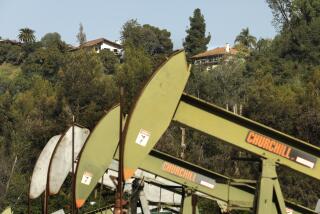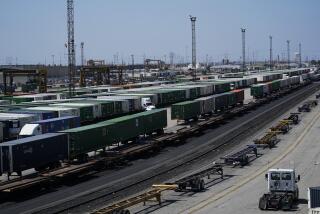EPA Acts to Ease Clean-Air Rules; 9 Northeast States Sue
WASHINGTON — The Bush administration issued rules Tuesday to make it easier for industrial plants and refineries to modernize without having to buy expensive pollution controls -- and immediately was sued by nine states charging that the changes undermine their efforts to protect public health.
The Environmental Protection Agency regulations, which go into effect in March, amount to a major change in the way older industrial plants will have to deal with air pollution when they expand, make major repairs or modify operations to increase efficiency.
While the administration called the new approach badly needed to remove barriers to innovation and increased productivity, the lawsuit -- filed only hours after the changes became final -- argues that new breaks given to industry amount to a “gutting” of the 1970 law that has been responsible for key air quality improvements over the last three decades.
The more relaxed requirements “will bring more acid rain, more smog, more asthma, and more respiratory diseases to millions of Americans,” said New York Atty. Gen. Eliot Spitzer, calling them “a betrayal of the right of Americans to breathe clean, healthy air.”
Along with New York, eight other Northeastern states -- Connecticut, Maine, Maryland, Massachusetts, New Hampshire, New Jersey, Rhode Island and Vermont -- joined in the lawsuit filed in the U.S. Court of Appeals in Washington.
Officials in the Northeast are especially concerned about the potential for increased industrial and power plant pollution because much of the chemical releases from coal-burning power plants and older factories in the Midwest and Ohio Valley drifts eastward, making it harder to meet federal air quality standards in their states.
The changes in the so-called new source review regulations have been in the works since the early weeks of the Bush administration. A wide range of industries lobbied heavily for an easing of the rules, arguing they keep companies from making needed improvements.
EPA and White House officials have maintained that the regulations -- as they were interpreted and implemented in recent years -- have kept companies from making some changes that would have cut pollution, not increased it.
The changes “will be positive for the environment,” EPA spokesman Joe Martyak said in response to the lawsuit.
Among the changes to become effective in March:
* Companies will be given greater flexibility to modernize or expand without having to install new pollution controls, although the changes may lead to greater air emissions.
* Plants that have installed state-of-the-art pollution controls will be assured they will not be required for 10 years to install more effective equipment even if they expand or change operations in a way that results in greater pollution.
* Plants with numerous pollution sources may increase pollution from some sources as long as overall, plant-wide air emissions are not increased.
* Companies are given greater leeway in calculating pollution to reduce the likelihood that new pollution controls will be required.
The states’ lawsuit argues that all of these measures violate the 1970 Clean Air Act, which exempted older plants from having the kind of emission controls newer facilities had to have -- but only under the condition that they not expand or make changes that significantly increase smokestack emissions.
More to Read
Sign up for Essential California
The most important California stories and recommendations in your inbox every morning.
You may occasionally receive promotional content from the Los Angeles Times.










